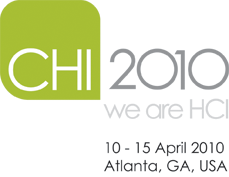Fourteen faculty, students, and scholars from the School of Information are preparing to present their research at this year's CHI conference in Atlanta, Georgia.
The I School contingent will be joining two thousand other conference attendees from 38 countries to focus on the design, user experience, and engineering of all types of computer-based systems. The CHI 2010 conference, entitled "We Are HCI," looks outward to the human experience of computing in the world, according to organizers.
I School faculty, students, lecturers, and visiting scholars will be presenting ten papers, sitting on four panel discussions, presenting two "works in progress" posters, participating in one workshop, and competing in two student research competitions.
Papers
- Assistant professor Tapan Parikh's paper "Avaaj Otalo — A Field Study of an Interactive Voice Forum for Small Farmers in Rural India" presents the usage patterns and social dynamics that emerged from their research and discusses implications of the findings on design of voice social media for developing regions.
- "Where There's a Will There's a Way: Mobile Media Sharing in Urban India," by visiting senior researcher Kentaro Toyama, describes a rich ecosystem surrounding the exchange of peer-to-peer entertainment media on Bluetooth-enabled mobile phones in urban India.
- Doctoral student Daniela Rosner and assistant professor Kimiko Ryokai present the paper "Spyn: Augmenting the Creative and Communicative Potential of Craft,", which continues the research Rosner began in her I School master's final project developing Spyn, mobile phone software that associates digital records with locations on fabric.
- Kimiko Ryokai also presents "Tangible Video Bubbles," a new video-based drawing space for children to create expressive video art; the paper discusses approaches to making video creation more concrete and playful for children.
- A second paper by Kentaro Toyama, "Intermediated Technology Use in Developing Communities," describes intermediated technology use in resource-constrained urban slums, including mechanisms, interface requirements, and its broader effects — research which may be helpful for designers of technology for "developing" regions.
- Kentaro Toyama's, paper "ViralVCD: Tracing Information-Diffusion Paths with Low Cost Media in Developing Communities" describes a low-cost method to trace information-diffusion paths and technology access in poor communities.
- The paper "Opinion Space: A Scalable Tool for Browsing Online Comments," by Kimiko Ryokai (and I School affiliate Ken Goldberg), reports results from a user study of Opinion Space, an online interface for visualizing and navigating a diversity of comments.
- Visiting scholars Kai Kuikkaniemi and Marko Turpeinen present "The Influence of Implicit and Explicit Biofeedback in First-Person Shooter Games," which describes a biofeedback adaptive first-person shooter game platform and an analysis of the impact of implicit and explicit biofeedback mechanisms.
- Lecturer Jeffrey Nichols, who is currently teaching the I School course "User Interface Design and Development," presents the paper "Here's What I Did: Sharing and Reusing Web Activity with ActionShot." ActionShot creates a fine-grained history of users' browsing activities, facilitates browsing and searching through this history, and enables sharing portions of the history through established social networking tools.
- Jeffrey Nichols also presents the paper "Creating a Lightweight UIDL: An Overview and Analysis of the Personal Universal Controller Project."
Panel Discussions
- Doctoral student Elizabeth Goodman participates in the panel "HCI, Communities and Politics," which juxtaposes several community-based HCI projects in which politics have been a significant factor and asks "How do we address the politics inherent in community-based HCI research?"
- Elizabeth Goodman is also on the panel discussing "Mapping the Landscape of Sustainable HCI"
- Assistant professor Tapan Parikh and visiting senior researcher Kentaro Toyama are both on the panel "Computing Technology in International Development: Who, What, Where, When, Why and How?" which engages the broader CHI community by explaining why international development is important to HCI as a discipline.
- Tapan Parikh is also on the panel "Making Food, Producing Sustainability," a discussion of sustainable CHI in the context of small-scale food producers.
"Works in progress" posters
- Doctoral student Neha Kumar and assistant professor Tapan Parikh present their research on "New Media and Folk Music in Rural India".
- The poster "Communication and Computing in Health Facilities of Southwest Uganda" presents Ph.D. student Melissa Ho's research. Melissa is part of the I School's program in ICTD (Information and Communication Technologies and Development) and is currently conducting her dissertation research in east Africa.
Workshop
- Master's student Andy Brooks will be presenting his paper "Tune In, Tweet on, and Twit out: Information snacking on Twitter" as part of the workshop "Microblogging: What and How Can We Learn From It?" (co-organized by I School alumna danah boyd, Ph.D. '08).
Student Competitions
- First-year master's students Dhawal Mujumdar, George Hayes, and Thomas Schluchter are competing in both the Student Research Competition and the Student Design Competition, two juried tracks for student work. Their project, "BuddyBearings," originated as a student project in the I School's Tangible User Interfaces course in Fall 2009.
CHI 2010, the 28th annual CHI conference, will be held April 10–15, 2010, and is sponsored by ACM SIGCHI (the ACM Special Interest Group on Computer-Human Interaction).









